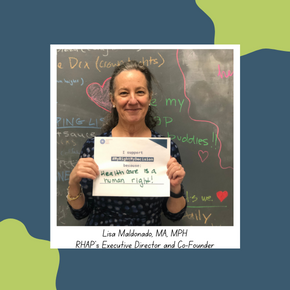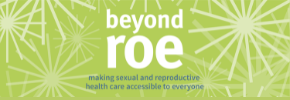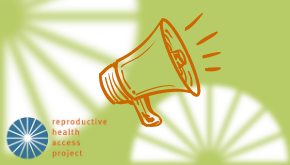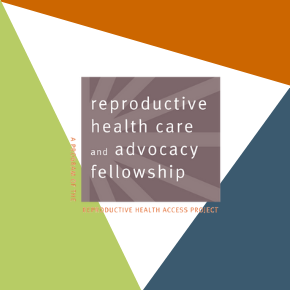Mar 20

You can Support Project Access today!

Dear RHAP Community,
I am reaching out with pride and gratitude to share some important news. After nearly 17 years with the Reproductive Health Access Project, I will be stepping down as executive director in October.
Co-founding, developing, and leading RHAP has truly been one of the joys of my life. The work of securing the fundamental rights to bodily autonomy and reproductive freedom is an honor, no matter how difficult or frustrating at times. RHAP’s core belief that reproductive health care is basic, essential health care that should be widely available is as important to me now as it ever was.
These are critical times for reproductive health, rights, and justice. RHAP’s mission has never been more relevant, and RHAP is well positioned to continue its important work into the future. We have an amazing team, an engaged board with strong, compassionate leadership, respected programs, solid values, and a strong vision guiding the organization. I have been working very intentionally with RHAP’s board for some time to plan for my transition. Emily Kane-Lee, RHAP’s board president, will keep you posted on RHAP’s plans moving forward.
I’m excited by what lies ahead both for RHAP and for myself. I thank you for all you’ve done to support RHAP’s accomplishments and hope we can continue to count on you as we enter an incredibly important period for our work.
In solidarity,
Lisa Maldonado, MA, MPH
Executive Director
A message from RHAP’s Board President
The Reproductive Health Access Project has announced that our beloved co-founder and executive director of 17 years, Lisa Maldonado, will be leaving RHAP in October. Lisa has been RHAP’s executive director from the organization’s founding in 2005 and, as early at 1997, began to lay the groundwork to found the organization as part of a group of advocates in New York City working to integrate abortion care into primary care settings.
Under Lisa’s leadership, marked by her strong organizational skills, energy, and collaborative spirit, RHAP grew into a national organization that has influenced clinical education, expanded the availability of contraception, abortion, and early pregnancy loss care in primary care, and developed innovative approaches to training clinicians in practice.
It is hard to put into words just how much of a difference Lisa has made in the reproductive health field through co-founding and leading this organization that trains, supports, and mobilizes primary care clinicians to ensure equitable access to sexual and reproductive health care, including abortion care.
Lisa’s many accomplishments include:
RHAP holds a unique place in the reproductive health, rights, and justice movement working at the intersection of primary care and reproductive health care and filling critical gaps in clinical education and care delivery. Lisa and her co-founders’ vision brought to life an organization that, even when faced with our country’s current and future challenges to abortion access, will continue to find ways to ensure equitable access to sexual and reproductive health care.
While we are sad to say good-bye to our founding executive director, the closing of this chapter marks a milestone in the evolution of RHAP’s development as an organization. This is a challenging time for reproductive health care in this country, but thanks to Lisa’s foundational leadership, an amazing staff, the loyal and strong support of foundations and hundreds of RHAP donors, a devoted board, and untold clinician supporters, RHAP is well positioned to continue its important work into the future.
RHAP has begun a national search for a new leader. If you have any questions please contact Board President Emily Kane-Lee, ekane-lee@reproductiveaccess.org, and join RHAP in thanking Lisa for her role in building an organization that has made enormous contributions to reproductive health.
Sincerely,
Emily Kane-Lee
Board President

As we learned last month, the Supreme Court is poised to fully overturn Roe v. Wade in a few any day now. While the pending ruling in the Dobbs v. Jackson Women’s Health Organization case is likely to make abortion illegal in at least 26 states, we know that even with Roe as the law of the land, abortion access in this country has long been out of reach for millions of people. In particular, Black, Indigenous, People of Color, immigrant communities, rural communities, queer communities, and those working to make ends meet have been disproportionately harmed by restrictions on abortion care. For many, a “post-Roe” world is already a reality.
As we plan for a future where abortion will become increasingly inaccessible for huge parts of the country, the Reproductive Health Access Project remains firmly committed to protecting and expanding access to abortion care. Our work centers individuals and communities seeking sexual and reproductive health care – including abortion care – no matter where they live or how they access care. We aim to be responsive to the primary care clinicians we work with across the country, providing them with tools, resources, training, and advocacy so that they can support the sexual and reproductive health needs of their communities, no matter where they are located.
As we move into even more uncertain times, RHAP is re-affirming and strengthening our abortion access work through our Beyond Roe strategy that will:
RHAP will continue to develop tools and resources that provide evidence-based, stigma-free information to support those self-managing their abortion. We will train and support primary care clinicians to provide person-centered, evidence-based SMA information and post abortion care. Our advocacy work will center decriminalizing SMA, following the lead of grassroots and reproductive justice organizations long working on decriminalization.
Over the next few weeks, we will share information, tools and resources, and learning opportunities so that you can better understand, support, and share our Beyond Roe abortion access strategy.
We are grateful for your support and your solidarity as we work to make sexual and reproductive health care accessible to everyone, everywhere.

“The AAFP is a powerful organization. Advocacy at NCCL gave me the opportunity to help direct AAFP policy and funds to causes that concern my patients and practice.” – Monica Agarwal, MD, New Jersey RHAP Fellow, and New Physician Delegate to NCCL
In April over 200 family physicians reunited in Kansas City for the first in-person convening of the National Conference of Constituency Leaders (NCCL) since the start of the pandemic. NCCL is the American Academy of Family Physician’s (AAFP) annual policy and leadership development meeting designed to amplify the voices of underrepresented constituencies within the Academy. During NCCL, family physicians who are part of member constituencies (women, minorities, new physicians, international medical graduates, and LGBTQ+ physicians) run for national leadership positions and have the opportunity to author and present resolutions.
Fourteen Network members attended this year’s conference, advocating for several resolutions focused on reproductive health, rights, other social justice issues. Resolutions included: Education about Self-Sourced Medication Abortion; Oppose Governmental Interference of Gender-Affirming Care for Minors; Improving Political Action Committee Contributions to uphold AAFP Values, and more!
Three Network members were elected into national leadership positions, including one who will help organize next year’s NCCL meeting and act as an alternate representative within the AAFP’s policy-making body, the Congress of Delegates (COD). Mobilizing within NCCL provides a great opportunity for Network members to learn the ropes of the AAFP policy-making process and to push the Academy to start taking action on reproductive health and justice issues ahead of the fall Congress of Delegates meeting. In an increasingly hostile environment to bodily autonomy and reproductive freedom, professional associations are critical platforms to reject the criminalization of health care and amplify health equity issues at the state and national level. It is inspiring to see our Network members continue to organize as a community, build momentum, and engage with the Academy as a powerful platform to advocate on behalf of patients and colleagues.

The Reproductive Health Care and Advocacy Fellowship is excited to announce that we are now accepting applications for fellows to start in the summer of 2023!
This one-year fellowship aims to train a diverse community of family medicine leaders to provide, teach, and advocate for access to equitable and person-centered reproductive health care, including abortion, within primary care. There are now fellowship positions available in Massachusetts, Michigan, New Jersey, New York, and Washington. For more in depth information on the fellowship please visit our webpage.
Applicants must be board-certified or board-eligible family physicians who will have completed residency training in the United States by August 1, 2023. Candidates should have the appropriate state licenses before the start date of the fellowship. Recent graduates and mid-career physicians are eligible. Candidates need not be fully trained in reproductive health procedures. RHAP seeks to build a diverse, inclusive, and intentional community of leaders and encourages applicants from backgrounds that have been historically excluded in medicine to apply.
For information on the application process, please visit our application information webpage. The application deadline is November 20, 2022. Applications will be reviewed on a rolling basis.
For questions and more information on the fellowship, please email fellowship@reproductiveaccess.org or visit the fellowship website.
Your gift allows us to train and support health care providers across the United States so they can offer patients compassionate and comprehensive care.
Mar 20
